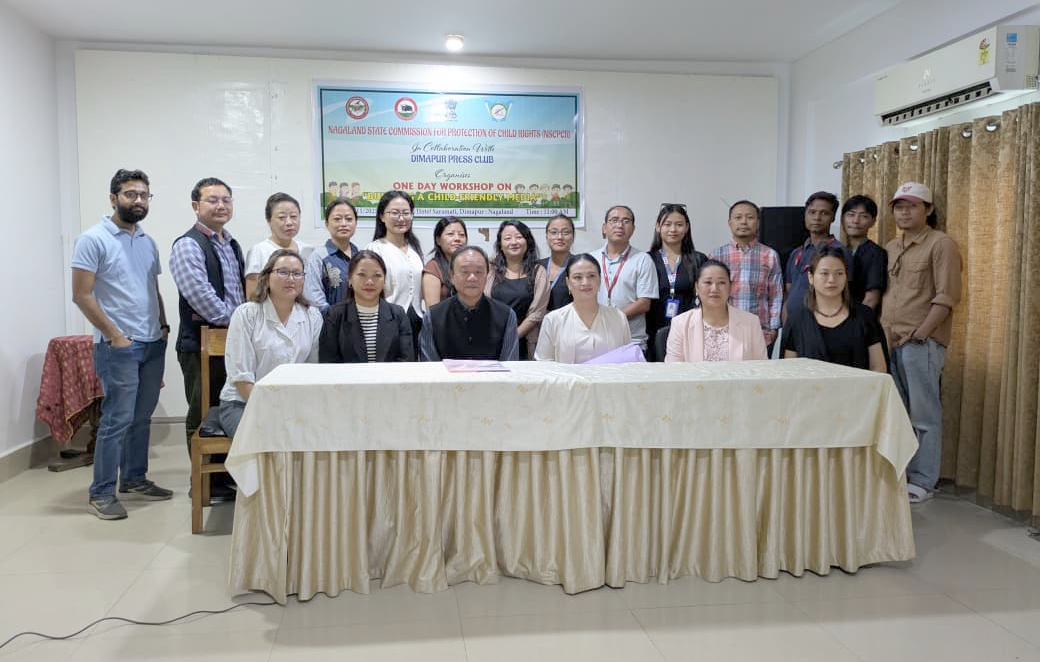Media professionals were today reminded that every story involving a child carries moral weight, as experts warned that insensitive or sensational reporting can cause irreversible damage to a child’s life and dignity.
The one-day training on ‘Building a Child-Friendly Media’, organized by the Nagaland State Commission for Protection of Child Rights (NSCPCR) in collaboration with the Dimapur Press Club at Hotel Saramati, stressed that traditional newsroom values are no longer enough to protect vulnerable minors in an era where content is permanent, searchable, and easily weaponised.
Special Public Prosecutor of the Fast Track Special Court, Dimapur, Imlimongla reminded participants that the media’s responsibility has grown exponentially with the rise of social platforms.
“Words heal and words wound,” she cautioned and referred to Constitutional safeguards and child-protection laws, reminding journalists that while the Constitution guarantees press freedom under Article 19(1)(a), this freedom carries reasonable restrictions—especially when the dignity and identity of children are at stake.
Imlimongla, who was the resource person of the training programme, also reminded journalists said that the Indian Constitution protects children’s dignity through Articles 14, 15(3), 21, and 39(f).
She further highlighted the legal obligations under the Protection of Children from Sexual Offences (POCSO) Act, including the mandatory reporting of sexual offences (Sections 19–21) and the strict ban on publishing a child’s identity in any form (Section 23). Similar prohibitions were highlighted under the Juvenile Justice (Care and Protection of Children) Act (JJ Act), Section 74, which bars revealing any identifying details of children, whether victims, witnesses, or accused.
Calling on journalists to resist sensationalism, she cited guidelines from the National Commission for Protection of Child Rights (NCPCR) and National Human Rights Commission (NHRC) that require the media to prioritize a child’s best interests, avoid disturbing visuals, and consult experts when necessary. She also pointed to provisions under the Bharatiya Nyaya Sanhita (BNS), warning that false or defamatory reporting involving children could attract penal consequences under Sections 353, 356, and 196.
Download Nagaland Tribune app on Google Play

In an age where harmful content spreads instantly and cannot be fully erased, she reminded media personnel that “Caution is not censorship — it is conscience.”
“Children are lives, not headlines,” she stressed, urging newsrooms to set up child-protection protocols, verify facts diligently, seek legal vetting, and ensure child helpline numbers are displayed in related reporting.
‘Sometimes silence protects’
Associate Editor of The Morung Express, Dr Moalemba Jamir, urged journalists to rethink their priorities in the era of digital pressure and content-driven competition.
He said that sometimes silence protects, and the media must recognise that silence can serve a greater good—for a child’s dignity, privacy, and future.
With social media turning “everyone into a potential publisher,” Dr. Jamir questioned whether newsrooms are aligning their editorial choices with child rights or with the chase for virality.
He warned that revealing a child’s identity—whether the child is a victim, accused, or witness—creates lifelong scars.
“A child involved in a case today shouldn’t carry the scars into adulthood,” he said. “A child is best protected by silence, not exposure,” he adde.
He emphasised three core responsibilities for the media: Knowing when to withhold; prioritising protection over virality; and treating a child’s identity as sacred, not as content.
‘Strengthening child rights is a collective duty’
Delivering the keynote address, NSCPCR Chairman, Alun Hangsing underlined the vital role of media and other stakeholders in promoting child rights across the state.
He informed the gathering that the Commission, instituted in 2013, has spent the past decade addressing structural gaps. With a new team taking charge in 2023, Hangsing said the NSCPCR has renewed its focus on disseminating child-rights information to the grassroots and mobilising all agencies involved in child welfare.
As an autonomous statutory body, the Commission is mandated to monitor government departments, programmes, and policies related to child rights, he said.
Hangsing said the workshop is part of the Commission’s mission to empower media professionals with the knowledge and tools necessary to strengthen child-protection mechanisms statewide.

